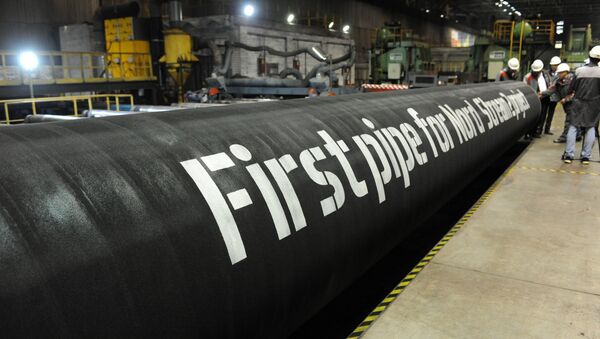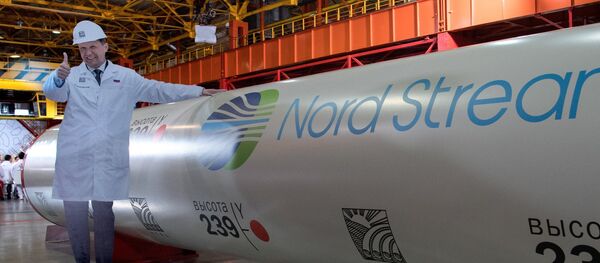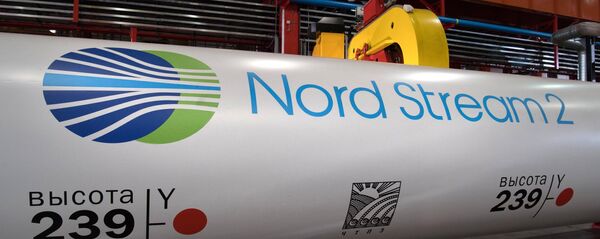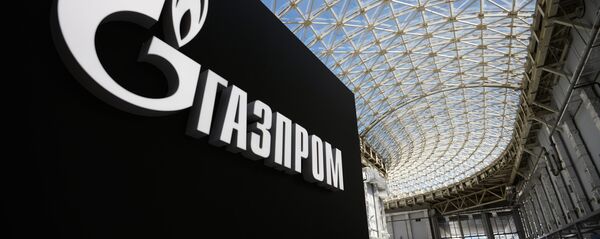The Nord Stream 2 project presumes the construction of two gas pipelines with a combined annual capacity of 55 billion cubic meters of gas.
The new 1,200-km pipeline is planned to be laid along the Nord Stream pipeline route from the Russian coast through the Baltic Sea to a hub in Germany. Shell, Engie, OMV, Uniper and Wintershall are the Russian giant Gazprom's partners in implementing the project.
Prof Kim Talus: "Negotiation abt EU energy law are no legal reason
— Sebastian Sass (@SebastianSass) 6 июля 2017 г.
for halting approval procedures of #NordStream2" https://t.co/MJhLIRPnu4
Late last week, it was reported that Brussels had delayed its decision on issuing a mandate to the European Commission for the talks on the construction of the Nord Stream 2 gas pipeline until autumn.
If the talks finally take place, the implementation of the project is likely to slow down. However in an interview with Sputnik Germany, Nord Stream 2 spokesman Steffen Ebert expressed confidence that the project will be implemented according to schedule.
"Now we are at the stage of obtaining permission. The procedure is in line with the Espoo Convention, according to which all countries of the Baltic region should be informed of the environmental consequences of the project. Additionally, national approval procedures are under way in five countries through which Nord Stream 2 will have to be laid. Given the experience of the Nord Stream 1 project, I can say that we are well within the plan's framework. Until the end of this year, we expect to get all the permits to begin construction of both branches of Nord Stream 2 in early 2018," he said.
Economics expert Roland Goetz also came to the conclusion that within the framework of Nord Stream 2, all the laws concerning the construction of gas pipelines are being complied with. He recalled that the gas pipeline will be laid via the exclusive economic zones of Denmark, Germany, Finland and Sweden, as well as through the inland seas of Germany and Denmark.
Ebert, for his part, expressed surprise about the planned EU talks related to Nord Stream 2, saying that in the process of obtaining permits; all the international, European and national legal norms are being observed.
"We do not understand what the matter is because both within the framework of the Nord Stream 2 project and while building other gas pipelines, we adhere to legal norms. Nord Stream 2 is just a means of transporting gas from Russia to the German border. We have nothing to do with the trading of gas and its further transportation, but the critics of the project often mix everything together," Ebert said.
He added that "we view these actions by the European Commission as politically motivated" and that "the agreement with Russia, which the European Commission is now seeking, is not needed."
Gazprom Pushes Ahead With Nord Stream 2 Pipeline to Germany — WSJ — @SenJohnMcCain.. stay in dusty #Arizona!!! https://t.co/EfwbfFeXDn
— C3RB3RUS (@__Cerberus__) 2 июля 2017 г.
"Regulatory bodies and legal departments in Brussels also confirmed that in this case, there is no legal vacuum and that the procedures are conducted on a legitimate basis. So one can only be surprised that the European Commission, in particular, EU Commissioner for Energy Canete, in fact, violate their own principles," Ebert pointed out.
He specifically stressed the purely commercial nature of the Nord Stream 2 project, expressing surprise about how the issue has been politicized.
"We view Nord Stream as a purely commercial project. Along with Gazprom, the largest shareholder, five more West European energy concerns are participating in the financing. In my opinion, the political aspect is unnecessarily underscored by the Eastern European countries. It's hard to say how political and legislative means will further be used to block this project," Ebert said.
Chinese Banks may Finance Russia’s Natural Gas Pipeline-Nord Stream 2 pipeline, to Europe https://t.co/tooOCPsK2C pic.twitter.com/KWJKqxCqH3
— One Belt One Road (@OBORCHINA) 23 июня 2017 г.
Washington is, in turn, doing its best to tie Europe to American shale gas, some experts said, pointing to the White House pondering the sanctions to be slapped directed against providing Europe with Russian gas and specifically against the Nord Stream 2 project.
Ahead of the G20 summit in Hamburg, US President Donald Trump visited Warsaw to negotiate the delivery of American liquefied natural gas (LNG) to Poland, among other things. In this vein, energy expert Kirsten Westphal said in an interview with Spiegel Online that Poland is especially up in arms against Nord Stream 2, and is pursuing its own interests.
"The Polish government sees Nord Stream 2 as a sort of political resource in foreign policy. Apart from Poland, Visegrad Group members Slovakia and Hungary are also opposing the construction of the Russian gas pipeline. The right-wing conservative government in Warsaw also used this opportunity to underline its relationship with the United States," Westphal said.
According to her, the US has repeatedly used its gas exports as a tool in its foreign and economic policy. As far as Russia is concerned, Westphal said that "I do not see a situation in which Russian gas could be effectively used as a weapon."
Separately, he mentioned the issue of stiff competition in the European gas market, given that the natural resources of Europe are running low and gas imports are expected to come to the fore. In this regard, Nord Stream 2 can be seen as an "indispensable" project, according to Ebert.
"If Europe places its stake on overseas liquefied gas and rejects the Russian pipeline gas…then the volume of LNG on the world market will quickly decline which will in turn make it much more expensive. It will mean that in terms of a price tag we will have to compete with Asia, so that the LNG tankers can go to European ports, not those in Japan," he concluded.





